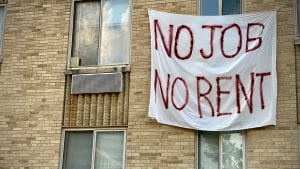COVID-19 Vaccines, A Harsh Winter, and Economic Relief
December 4, 2020
 Public health officials are offering good long-term news about the prospects of making a COVID-19 vaccine widely available during the first half of next year,1 but they are also cautioning Americans that this winter could be very “rough.”2 In addition to having worries about illness, death, and social isolation, many people are also feeling significant financial pain.3
Public health officials are offering good long-term news about the prospects of making a COVID-19 vaccine widely available during the first half of next year,1 but they are also cautioning Americans that this winter could be very “rough.”2 In addition to having worries about illness, death, and social isolation, many people are also feeling significant financial pain.3
The Race Toward a Vaccine
The United Kingdom recently approved a vaccine manufactured by Pfizer and will begin administering doses in the weeks ahead.4 In the United States, regulators are meeting on December 10 to discuss the same vaccine;5 they will meet again on December 17 to discuss a vaccine produced by Moderna.6 The vaccines could be administered in the United States before the end of this year; they will likely become available to the broader public on the basis of highest need by April.
LISTEN: “When and How You’ll Get a Vaccine,” a New York Times podcast
COVID-19 cases and deaths are surging around the United States7 and are returning rapidly in Europe.8 Health experts are warning against holiday travel, cautioning Americans to stay away from large groups and to avoid spending time with older family members.9 However, data suggests that a significant number of people ignored those cautions over the Thanksgiving holiday.10

Financial Struggles During COVID-19
Many Americans are experiencing serious financial impacts from COVID-19. Large numbers of people are unemployed or underemployed,11 small businesses are losing money or being forced to close,12 and increasing numbers of Americans, struggling to pay their bills and rent, report dipping into retirement savings and/or turning to food banks to feed their families.13 While the government has provided some economic relief and stimulus, it has been months since Congress addressed the financial harm of the virus.
However, Congress may be close to reaching a deal.14 A $900 billion economic relief package has gained bipartisan support in the Senate as well as the support of the House Democratic leadership.15 The proposal does not include stimulus checks, but it does include more aid to small businesses, restaurants, hotels, airlines, and other severely impacted industries. The bill also includes an extension of unemployment aid and funding for state and local governments that have seen their tax revenues shrink during the pandemic.16 Congress has limited time to act before going into the winter recess.
READ: “Stimulus Bill Proposal: Unemployment Help Is There; Stimulus Checks Are Not,” from Cox Media Group
Discussion Questions
- How has the pandemic impacted your daily life? What about the lives of friends and family?
- How has the pandemic impacted your community?
- Are there businesses in your community that have closed during the pandemic?
- Do you think Congress should pass the current proposal as is? Why or why not?
- What else, if anything, do you think governments should do in response to the pandemic?







